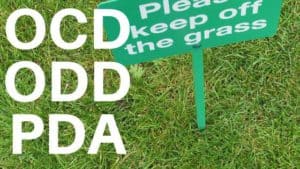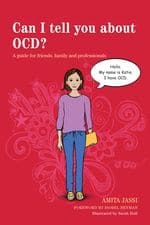
What is OCD?
Obsessive Compulsive Disorder (OCD), is defined as repetitive behaviours or mental acts that the person feels driven to perform in response to an obsession, or according to rules that must be applied rigidly. The behaviours or mental acts are aimed at preventing or reducing distress or preventing some dreaded event or situation. However, these behaviours or mental acts either are not connected in a realistic way with what they are designed to neutralize or prevent, or are clearly excessive. Dean Beadles says “We all have checked the door, but when you go back 20 times and worry something BAD is going to happen if you don’t, that is OCD”.
In addition to these criteria, at some point during the course of the disorder, the sufferer must realize that his/her obsessions or compulsions are unreasonable or excessive. Moreover, the obsessions or compulsions must be time consuming (taking up more than one hour per day), cause distress, or cause impairment in social, occupational, or school functioning. OCD often causes feelings similar to that of depression.
Recent studies also indicate a substantial relationship between Autism Spectrum, OCD, PDA and ADHD.
Ways to Manage OCD
There are different ways to manage OCD, and the best and easiest way to do it is to work with a psychiatrist or psychologist. By working with a professional, you’re most likely to find the approach, or combination of tactics, that’s going to work for you.
Often a combination of strategies is required. In most cases you will not see massive or immediate changes with intervention, but they will happen over time.
Recommended strategies include:
- Medication
- Exercise
- Keeping a Journal
- Relaxation Techniques
What is ODD?
Oppositional Defiant Disorder (ODD) is described by the Diagnostic and Statistical Manual of Mental Disorders (DSM) as an ongoing pattern of disobedient, hostile and defiant behaviour toward authority figures which goes beyond the bounds of normal childhood behaviour. People who have it may appear very stubborn. Temper tantrums, stealing, bullying, and vandalism are some of the key symptoms of oppositional defiant disorder. ODD children may present as negative, defiant, unable to take “no” for an answer, deliberately annoying others, easily annoyed themselves, or blaming others for all that goes wrong. The child’s behaviour often disrupts the child’s normal daily activities, including activities within the family and at school.
No one knows what causes ODD. It is often identified with other diagnoses such as Autism Spectrum, ADHD, OCD, or Tourette’s syndrome.
Although there is some debate over whether ODD and PDA are different disorders or the same, I do find similar strategies seem to be effective for both.
Seven Quick Tips for Supporting Students with ODD/PDA
- Choose your battles. As soon as you find yourself in conflict ask “Is conflict going to resolve or escalate the situation?”
- Try distracting the child to something else in a very calm voice.
- Try to catch the child doing LOTS of great things. Even if they sit still for one second, tell them “great sitting” as soon as they do the right thing!
- Let them be your special helper.
- NEVER take what they say personally (yes we know that sometimes what they say is awful – killing, hurting, etc.,
but what they want the most is a reaction so don’t react!) - Remember that strategies will wear out very quickly, and when they do, move on to another strategy.
- Children with ODD have a strong resistance to change. Any changes can cause a lot of anxiety, so look at strategies to help them manage their anxiety.
Great Resource to explain Obsessive Compulsive Disorders
By Amita Jassi
A guide for friends, family and professionals. Meet Katie – a teenager with Obsessive Compulsive Disorder (OCD). Katie invites readers to learn about OCD from her perspective, helping them to understand what it is, how her obsessions and compulsions affect her daily life, and how people around her can help. With illustrations throughout, this will be an ideal introduction to OCD for both young people and older readers. It shows family, friends and teachers how they can support someone with the condition and will be an excellent way to start a conversation about OCD, in the classroom or at home.
$22.95 (plus P & H)
